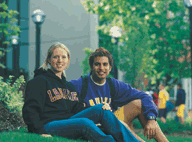Student Appeals
A graduate student may appeal any decision taken by an individual or body acting in the name of the university that affects the academic standing of the student and that the student believes was made unfairly. Before appealing any decision, a student should attempt to resolve the issue through informal or formal procedures (e.g., see Grade Reassessment). With the exception of the regulations pertaining to grade reassessment, no appeal may be commenced when the student has graduated from the program to which the appeal relates.
Normally, the Graduate Student Appeals Committee (SAC) is the first level of appeal for graduate students and the Senate SAC is the second and final level of appeal. It should be noted that there are limits to the grounds of appeal at the second level (i.e., there must be new evidence or evidence of a substantial procedural irregularity; see Procedures for Considering Student Appeals. Furthermore, there are different procedures regarding appeals of academic misconduct decisions (see WLU policy 12.2: Student Code of Conduct and Discipline).
A student's status in his or her academic program will remain unchanged while an appeal is pending. The following deadlines apply to student petitions:
- Students wishing to appeal an academic decision must do so within six (6) weeks of the date of receiving the decision.
- Normally, students wishing to seek any kind of extension to program time lines must submit their request at least two (2) months prior to the date when the work is due. This deadline may be waived in exceptional circumstances at the discretion of the chair of the Graduate SAC.
Normally, the Graduate Student Appeals Committee (SAC) is the first level of appeal for graduate students of decisions that affect their academic standing and the Senate SAC is the second and final level of appeal (there are different procedures in matters concerning academic misconduct; see WLU Policy 12.2: Student Code of Conduct and Discipline).
The Graduate SAC will consider and decide all petitions within six (6) weeks of the filing of the petitions. All necessary documentation and information must be complete. Students should submit the petition to the Office of Graduate and Postdoctoral Studies. The student will be advised of the decision and the reasons therefore, in writing.
There are three types of appeals to the Graduate SAC. First, an appeal may be filed on the grounds that the normal faculty or university rules, calendar requirements and regulations have not been properly or fairly applied to the student's circumstances. In this instance, the Graduate SAC will review the circumstances and the rule and it shall make a decision accordingly.
The second type of appeal is when a student asks the Graduate SAC for relief from the faculty or university rules, calendar requirements and regulations because of extenuating circumstances, such as illness or bereavement. In this instance, the Graduate SAC will review the extenuating circumstances and it may exercise its discretion to grant an exception to the student.
The third type of appeal is for grade reassessment. Petitions for grade reassessment should only be initiated after informal and formal processes have been pursued at the program or department level (see Grade Reassessment).
Because a student is not able to appear in person before the Graduate SAC, it is important that he or she submit the details of all relevant material with a petition. Thus, all petitions should be in writing, in accordance with the following expectations:
- the full name, address, telephone number and student number of the person appealing;
- the specific decision which is being appealed;
- the form of redress requested;
- the specific grounds on which the appeal is made;
- a summary of the evidence, including the names and addresses of any witnesses, that the student is prepared to offer in support of these grounds
Appended to the statement of petition, if not fully included within it shall be:
- the text of the decision being appealed;
- the text of the relevant procedural regulations (if any) allegedly violated or otherwise deemed applicable to the case;
- and the documentation and written evidence to be used in support of the appeal.
Students must submit a petition within six (6) weeks of the date of receiving the decision to be appealed.
With some limitations (i.e., there must be new evidence or evidence of a substantial procedural irregularity), a decision of the Graduate SAC may be appealed by the student to the Senate SAC, in accordance with the Procedures for Considering Appeals by the Senate SAC. These procedures are also available at the Office of the Registrar and the Office of the Dean of Graduate and Postdoctoral Studies.
A copy of the procedures of the Graduate SAC and the required form may be obtained at the Office of Graduate and Postdoctoral Studies. The WLU ombudsperson is available for consultation in the preparation of an appeal.
See Graduate Student Academic Appeals (and required form).
Normally, the Graduate Student Appeals Committee (SAC) is the first level of appeal for graduate students of decisions that affect their academic standing and the Senate SAC is the second and final level of appeal (there are different procedures in matters concerning academic misconduct; see WLU Policy 12.2: Student Code of Conduct and Discipline).
The Graduate SAC will consider and decide all petitions within six (6) weeks of the filing of the petitions.
The committee shall consist of 7 members. Members shall include:
- Dean (or designate) of the Faculty of Graduate and Postdoctoral Studies (who will chair the committee and be non-voting except in the case of a tied vote);
- 3 graduate students (from 3 different Faculties, elected from the graduate student body);
- 3 faculty members (from 3 different Faculties, all with graduate faculty status, elected by Graduate Faculty Council);
- the Senior Administrative Officer of the Faculty of Graduate and Postdoctoral Studies (or designate) (non-voting, recorder of minutes)
Normally, the chair will be the Dean (or designate).
A student's status will remain unchanged while an appeal is pending. The following deadlines apply to student petitions:
- Students wishing to appeal an academic decision must do so within six (6) weeks of the date of receiving the decision.
- Normally, students wishing to seek any kind of extension to program time lines must submit their request at least two (2) months prior to the date when the work is due. This deadline may be waived in exceptional circumstances at the discretion of the chair.
- Students wishing to change their registration status must submit their petition six (6) weeks prior to the start of the applicable term.
Because a student is not able to appear in person before the Graduate SAC, it is important that he or she submit the details of all relevant material with a petition. Thus, all petitions should be in writing, in accordance with the following expectations:
- the full name, address, telephone number and student number of the person appealing;
- the specific decision which is being appealed;
- the form of redress requested;
- the specific grounds on which the appeal is made;
- a summary of the evidence, including the names and addresses of any witnesses, that the student is prepared to offer in support of these grounds.
Appended to the statement of petition, if not fully included within it shall be:
- the text of the decision being appealed;
- the text of the relevant procedural regulations (if any) allegedly violated orotherwise deemed applicable to the case; and
- the documentation and written evidence to be used in support of the appeal.
The following guidelines apply to all hearings:
- The chair of the Graduate SAC shall have control over the proceedings.
- A record in the form of minutes shall be kept of the proceedings.
- The parties shall have access to all relevant documents to be relied upon by the committee in hearing the appeal.
- When a respondent submits documentation or a written response to the appeal, the student shall be permitted to submit a written rebuttal to the documentation and/or the written response material.
- If the student's written rebuttal raises new issues, the respondent may submit a written reply to the student's written rebuttal. No further submissions will be accepted.
- The chair of the committee may make reasonable rulings and decisions concerning the procedural aspects of a hearing according to the circumstances.
- Where a committee member was party to recommending or making the decision being appealed or where any other conflict of interest arises, that person shall so disclose and normally shall not participate in the consideration of the appeal by the Graduate SAC. If there is a question as to the existence of a conflict of interest, the majority of the other members of the committee shall determine whether there is a conflict of interest. If the committee member in question is chair of the committee, the committee shall elect another chair, who will chair the discussion of the specific appeal.
- Quorum for the Graduate SAC will be four members, one of whom must be a student member and one of whom must be a faculty member other than the chair. Decisions will be taken in camera and will be made by a majority vote of the voting members present. The student and respondent will receive written notice of the decision, with reasons, within 10 days of the hearing of the appeal. Copies of the decision will also be forwarded to the graduate co-ordinator of the department or program, the department chair (if applicable) and any other pertinent individuals.
- The Graduate SAC has the power to
- deny the appeal
- uphold all or part of the appeal, decide the issues and substitute its own decision.
Within prescribed limits (see Procedures for Considering Student Appeals), the decision of the Graduate SAC may be appealed to the Senate SAC.
Persons with questions regarding the above procedures should contact the Office of Graduate and Postdoctoral Studies.




